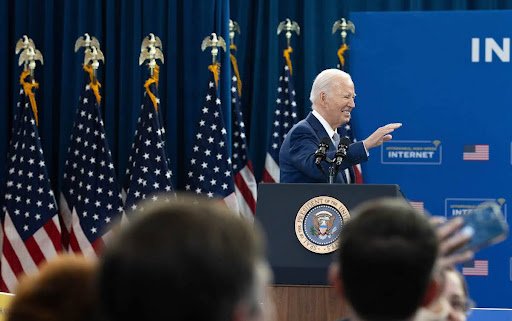President Biden Aims to Bridge the Digital Divide in North Carolina
President Biden speaking at Abbott’s Creek Community Center in Raleigh, North Carolina on January 18, 2024. Source: Taylor Holbrooks, CPR
North Carolina is a presidential battleground, going red in every election since 1980—except for 2008 when Barack Obama won the state. President Joe Biden believes he can win over states like North Carolina as the 2024 presidential election approaches.
Biden traveled to the Abbott’s Creek Community Center in Raleigh, North Carolina, on January 18, 2024, with the slogan “Investing in America'' and wifi logos posted around the event’s stage. The president announced his administration's promise that “over the next three years, over 300,000 homes and businesses all across North Carolina will be connected with affordable high-speed internet.” It was reported in 2023 that at least 1 million households in North Carolina still lack access to high-speed internet.
Residents of N.C. have spoken out in community-led outlets, such as a Facebook group, “Orange County Citizens Without Broadband Access,” to vocalize their first-hand experiences living without access to the internet. The COVID-19 pandemic exacerbated the already widening digital divide in the state, forcing people to speak out. The ability to work from home has opened up opportunities for companies and schools, but how does that impact those living without access to high-speed internet?
In 2021, the American Immigration Council reported more than one in five low-income households in N.C. had no access to broadband internet, compared to one in twenty middle- and high-income households that did not have access. Income is one of many factors that has disqualified people from accessing the internet. The Digital Equity Act of 2021 reports that individuals who live in a rural area, have a disability, are veterans, speak English as a second language, are over 60 years old, or are in a racial or ethnic minority group all disproportionately suffer from gaps in broadband internet access.
In response to the state’s digital divide, Biden revealed that his administration is taking a “major step” to invest an additional $82 million to connect homes and businesses, emphasizing building the state’s economy by generating jobs in the manufacturing of fiber optic cables. This investment supports North Carolina Governor Roy Cooper’s Broadband Stop Gaps Solutions Program which is using $90 million from the federal American Rescue Plan Act funds to provide high-speed internet across all the state. Much of Biden’s tenure as president has focused on reversing labor offshoring and the U.S.’s deindustrialization.
Biden's two prior trips to North Carolina in 2023 also focused on economics. The president has struggled to gain traction in N.C. with his message to bring jobs and grow the economy, as voters remain concerned about high costs. A poll from Associated Press shows that economic success has been a weakness for Biden, with inflation hitting a four-decade high in June 2022. The president has tried to empathize with voters grappling with higher inflation by directing his policies towards the creation of factory and construction jobs with middle-class wages.
Labor union workers were asked to attend the event on January 18, where Biden reinforced promises made in the 2021 Infrastructure Investment and Jobs Act (IIJA), focusing on strengthening federal investments like the broadband buildout used to generate manufacturing jobs in North Carolina.
Unionized workers across North Carolina attended, eager to hear how Biden wants to support them. Communication Workers of America (CWA) was one of the unions represented at the event. In an interview, Grant Welch, CWA’s legislative director, said, “President Biden is the most pro-union president we have had in recent history. So it's good to see him push labor protections and labor standards in his policies, which doesn’t just benefit labor unions, but workers all across the board.”
Biden’s partnership with Governor Cooper has emphasized job growth, which has led to the expansion of fiber-optic cable manufacturing jobs in N.C. A $275,000 donation brought to life CommScope Stage, the company that has become the backbone of America’s internet infrastructure, manufacturing fiber-optic cable—thin glass strands capable of transmitting data at the speed of light. CommScope has generated over 2,500 jobs in Hickory, N.C., and workers across the state are eager to see job opportunities grow with the expansion of fiber-optic cable production within the state.
Biden narrowly lost N.C. in 2020 by 1.34 percentage points to then-President Donald Trump. As the 2024 election looms, Biden hopes to capture N.C. voters’ attention with the promise of affordable high-speed internet and job growth.
President Biden states that “high-speed internet isn’t a luxury anymore, it’s an absolute necessity.” Biden has captured the attention of North Carolina voters as his administration continues to make strides in closing the state’s digital divide.

